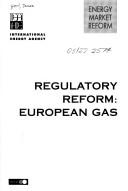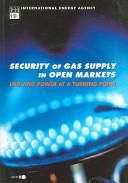| Listing 1 - 5 of 5 |
Sort by
|
Book
ISBN: 9264885994 9264401695 Year: 2019 Publisher: Paris : OECD Publishing,
Abstract | Keywords | Export | Availability | Bookmark
 Loading...
Loading...Choose an application
- Reference Manager
- EndNote
- RefWorks (Direct export to RefWorks)
Natural gas demand grew at a remarkable clip last year, increasing by 4.6%, its highest growth rate since the beginning of the decade. Future growth will be more measured, supported by economic expansion in emerging markets - especially in Asia - and sustained policy support in the People's Republic of China to battle air pollution. The supplies to meet that new growth will come from both new domestic production in these fast-growing economies but also increasingly from major exporting countries, led by the development of the abundant shale gas resources in the United States. International trade, supported by the strong growth in liquefied natural gas export capacity, will play a growing role in the development of natural gas markets as they move further towards globalisation. The recent convergence in market prices in major regions provides an indication of this increasing integration. However, establishing market-driven pricing mechanisms in fast-growing countries remains a challenge - albeit one that is being addressed by pricing reforms in several leading emerging economies around the world.

ISBN: 9264185585 9264188371 Year: 2000 Publisher: Paris : OECD Publishing,
Abstract | Keywords | Export | Availability | Bookmark
 Loading...
Loading...Choose an application
- Reference Manager
- EndNote
- RefWorks (Direct export to RefWorks)
The countries of Continental Europe have started the process of reforming their natural gas markets. This book sets the context for, and considers the issues raised by, these reforms. It also analyses the key elements of effective reform, such as third party access to the gas infrastructure. Unlike earlier reformers, Europe faces important challenges of growing import dependency and reliance on a few large producer countries, against a background of strong demand growth. It is vital that both short and long term security of supply are sustained in the new market conditions. At the same time a key objective of reform is to improve economic efficiency through competition and short term trade, in order to reduce prices for natural gas consumers. The book argues that security and competition are not incompatible, and that security can be enhanced by competition provided that reform is handled with care. As Europe implements the EU Gas Directive, this book is a timely review for energy policy makers and others involved in the reform process. It is the latest in a series of IEA publications on energy market reforms.
Gas industry --- Natural gas reserves --- Energy policy --- Gaz --- Gaz naturel --- Politique énergétique --- Industrie --- Réserves --- Energy policy -- Europe. --- Gas industry -- Europe. --- Natural gas reserves -- Europe. --- Business & Economics --- Industries --- Government policy --- Deregulation --- Natural gas industry --- Energy industries

ISBN: 1280172649 9786610172641 9264108076 9264108068 Year: 2004 Publisher: Paris : OECD Publishing,
Abstract | Keywords | Export | Availability | Bookmark
 Loading...
Loading...Choose an application
- Reference Manager
- EndNote
- RefWorks (Direct export to RefWorks)
This book analyses the most recent developments in security of gas supply and reliability in all IEA regions. Reform has led to open markets, where supply and demand are balanced by the market. In the gas sector, supply is capacity-bound and large parts of the demand side are inelastic. The study looks at how governments and other stakeholders in IEA countries respond to the need to create a framework that enables the players to deliver secure and reliable gas supply at the border and all the way down to the final customer.
Gas industry. --- Gas supply. --- Liquefied natural gas industry. --- Natural gas reserves. --- Gas industry --- Liquefied natural gas industry --- Natural gas reserves --- Industries --- Business & Economics --- Gas reserves --- Natural gas --- Natural gas supply --- Reserves of natural gas --- Natural gas industry --- Reserves --- Energy industries --- Gaz --- Gaz naturel liquéfié --- Gaz naturel --- Industrie --- Réserves
Book
ISBN: 0833048864 0833049429 9780833049421 9780833048868 Year: 2009 Publisher: Santa Monica, CA : RAND,
Abstract | Keywords | Export | Availability | Bookmark
 Loading...
Loading...Choose an application
- Reference Manager
- EndNote
- RefWorks (Direct export to RefWorks)
This book discusses the opportunities and risks the government of Israel faces in shifting to a greater reliance on domestic and imported natural gas. By applying newly developed methods for strategic planning and decisionmaking under deep uncertainty, the analysis seeks to help the Israeli government engage in managed change by choosing robust strategies that minimize potential consequences of relying more heavily on natural gas.
Energy policy --Israel. --- Gas industry --Israel. --- Natural gas reserves --Israel --Forecasting. --- Strategic materials --Israel. --- Gas industry --- Natural gas reserves --- Energy policy --- Strategic materials --- Business & Economics --- Industries --- Forecasting --- Forecasting. --- Critical materials --- Energy and state --- Power resources --- State and energy --- Gas reserves --- Natural gas --- Natural gas supply --- Reserves of natural gas --- Natural gas industry --- Government policy --- Reserves --- Materials --- Military policy --- Raw materials --- Industrial policy --- Energy conservation --- Energy industries --- E-books
Book
ISBN: 1455231029 1462358608 1283570564 9786613883018 1455217794 1455217875 Year: 2011 Publisher: [Washington, District of Columbia] : International Monetary Fund,
Abstract | Keywords | Export | Availability | Bookmark
 Loading...
Loading...Choose an application
- Reference Manager
- EndNote
- RefWorks (Direct export to RefWorks)
We present evidence on one facet of energy security in OECD economies - the extent of diversification in sources of oil and natural gas supplies. Viewed from the perspective of the energy-importing countries as a whole, there has not been much change in diversification in oil supplies over the last decade, but diversification in sources of natural gas supplies has increased steadily. We document the cross-country heterogeneity in the extent of diversification. We also show how the extent of diversification changes if account is taken of the political risk attached to suppliers; the size of the
Energy security --- Petroleum reserves --- Natural gas reserves --- Gas reserves --- Natural gas --- Natural gas supply --- Reserves of natural gas --- Oil reserves --- Oil supply --- Petroleum --- Petroleum supply --- Reserves of petroleum --- Oil fields --- Energy dependence --- Energy independence --- Energy insecurity --- Security, Energy --- Energy policy --- Reserves --- Energy security. --- Energy policy.
| Listing 1 - 5 of 5 |
Sort by
|

 Search
Search Feedback
Feedback About UniCat
About UniCat  Help
Help News
News